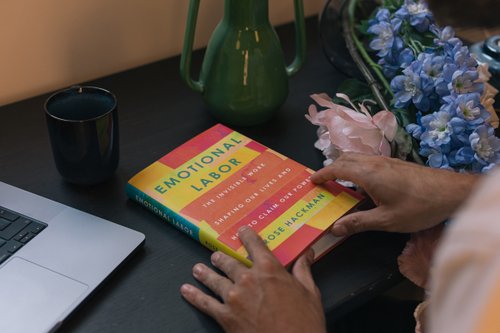Racial trauma in the workplace: How to take back control and heal
Jun 28, 2022
6 mins


Toronto expat and Paris-based journalist
It was years before Minda Harts began to connect the dots and realize her panic attacks, depression, and weight loss were the result of racial trauma. Throughout much of her career as a fundraising consultant, Harts had normalized the racialized microaggressions from her white co-workers. Often the only Black person in the office, and having resigned herself to a steady stream of often snide remarks, she recalls one instance when her white manager looked at the burnt orange nail polish Harts was wearing, saying “You people love your bright colors” before embarking on a 15-minute spiel about Black people and color.
“It was my first entryway to corporate America and I was met with this type of language. So from there, I told myself, ‘This just must be the way it’s going to be,” Harts recalls. “I didn’t realize that toxic behavior and inequality would later impact how I would see myself and show up in the workplace.”
After more than a decade in toxic work environments in which she was belittled for being Black, Harts began to stand up for herself, letting her colleagues know that their racialized comments were unacceptable. Harts documents her experiences in her 2021 book Right Within, How to Heal from Racial Trauma in the Workplace, a work written for Black and Brown women and other communities of color. We spoke to Harts to get her advice on how racialized workers can find the courage to speak up, take back control of their work lives, and heal from racial trauma.
What exactly is racial trauma?
My definition of racial trauma is constant exposure to micro- and macro-aggressions that are due to the color of your skin. But you can also be traumatized for being one of a few, be it [through] ageism, homophobia, or being a mother in the workplace. For me, that constant exposure to racialized aggressions, whether it was someone calling me the wrong name or mistaking me for another Black person in the office, or talking about my choice of hairstyles, has nothing to do with the actual job I’m here to do. It’s very much trying to belittle someone who isn’t in the majority. I don’t think most colleagues show up to the workplace and say, “Who can I racially aggress today?” but I think, because we’ve let a lot of toxic behavior go unchecked, there has been no resolution. And I do believe that we can eliminate these barriers only after we first acknowledge them.
How does racial trauma manifest?
Trauma manifests differently depending on the person. But for me, I didn’t start to see the signs of my trauma until maybe year 13 of my 15 years in the workplace. It started with panic attacks, depression, and weight loss. I realized that every time I was around certain colleagues I would start to panic or shrink – and it really started to affect how I showed up in meetings. Whenever they were in a meeting with me, I would start to have a panic attack and I wouldn’t be able to contribute to the meeting because I couldn’t speak.
“Whenever they were in a meeting with me, I would start to have a panic attack and I wouldn’t be able to contribute to the meeting because I couldn’t speak.”
At first, I thought there was something wrong with me. I couldn’t make the connection to the environment I was in. Eventually, I realized that every time I saw this person’s name pop up in my inbox or call me on the phone, I’d get that feeling. And I realized that this isn’t okay.
That’s intense…
And then on top of that, you’re also supposed to do your job. And when you’re battling all these extra things that aren’t in the job description, it’s very hard for you to do the best work of your career.
You’ve spoken before about how prejudices can force Black, Brown, and other racialized job candidates to flatten their identities and code-switch. What are some of the ways the work experiences of a white person and a person of color can differ?
There are a lot of people who are not aware of how their colleagues experience the workplace. Just because we work at the same place doesn’t mean we’re experiencing the same things.
For example, I chose to use the name Minda [her full name is Yasminda] on my resume because that way, hiring managers wouldn’t think I was ethnic or have a hard time pronouncing my name. Those are the sorts of things we have to be very intentional about doing before we even get a chance for people to meet us. A Black woman may also choose not to wear her hair in a natural state. She might decide to wear it blown out or straight because of the perception that Black hair may not be seen as professional, according to those in the dominant majority.
“I chose to use the name Minda [her full name is Yasminda] on my resume because that way, hiring managers wouldn’t think I was ethnic or have a hard time pronouncing my name.”
There’s a lot of pressure on people of color when they enter predominantly white workspaces to try to assimilate. That added layer – or Black tax – is just what we have to do to get in the door and I don’t think our colleagues understand how traumatic that can be. On the flip side, I don’t think many of us who are experiencing this racialized trauma realize how this could potentially affect us even if we don’t see the signs right away. Perhaps we’re taking that home and our family doesn’t get the best of us because we have been traumatized. It shows up in a lot of different ways for a lot of different people.
How should you confront your colleagues or bosses about these microaggressions and our racialized trauma without fear of reprisal?
This is a hard question because every work environment is different and everyone has a different personality. But I will say, give yourself permission to let people know what good looks like to you. For example, if I could go back in time to the nail polish situation with my manager, I would have a conversation with him and might say something like, “You made a comment about my bright colors. It made me feel uncomfortable and I would appreciate it if you didn’t make comments like that anymore.” I think we have to be open, honest, and direct. I can’t control how he responds to me at that moment, but at least it’s a win for me because I’ve at least let you know that this behavior isn’t okay.
What are some tips on how to handle an active situation in which you feel like you’re a victim of racial trauma in the workplace?
Document everything. [For example, you can write] “On Tuesday at 4:59 pm, I had a conversation with X and let him know that this is not okay with me and this is how he responded.” So if you ever need to go to HR, you have everything in a paper trail. You can’t control how they respond and they might try to gaslight you, but at least you were clear with your boundaries. I really want Black and Brown employees to take back their power and establish boundaries.
“You can’t control how they respond and they might try to gaslight you, but at least you were clear with your boundaries.”
That’s an important point you make on being gaslit about your experiences and being accused of playing the race card . . .
That’s another layer of the trauma. We show up in the workspace being the only person of color, or one of the only ones, and when we are experiencing racism or sexism or any other -ism, and we have other people who’ve never experienced racism, telling us that that’s not what it is, it’s very difficult. Again, none of this has anything to do with the job description we were hired for, but now we have to navigate everyone else’s biases in the workplace as well.
“none of this has anything to do with the job description we were hired for, but now we have to navigate everyone else’s biases.”
But how do you differentiate between a workplace personality conflict, as opposed to a racially motivated aggression?
That’s why documentation is so important because you can see if it’s a one-off experience or if you’re seeing a pattern of aggression. Documentation is also good for your mental health. You’re no longer questioning yourself and wondering whether you made it all up in your head. You’re actually seeing that there’s a pattern of abuse in the workplace.
It’s important to understand intention versus impact. That person’s intention may have not been to racially aggress you, but two things can be true at the same time: Your intention may not have been race-based but the impact that it’s having on me is impeding my mental health and safety in the workplace. And that information is enough for me to have that conversation with you. When you’re documenting, you can also see what your triggers are.
“When you’re documenting, you can also see what your triggers are.”
How can Black and Brown women leverage their experience and overcome their trauma?
It has to do with courage. For a long time, we have not been encouraged to speak our truth and talk about hard topics in the workplace like race. Now that there’s an opportunity, to be honest about our experiences, we have to collectively talk about these things so that we can change the status quo. It’s about reframing it so that you [can see you] don’t have to just survive in the workplace but that it’s also possible to thrive.
Minda Harts is also an adjunct assistant professor at NYU Wagner. Her new book “You Are More than Magic: The Black and Brown Girls’ Guide to Finding Your Voice” was written to empower young Black and Brown women before they enter the workplace.
Photo: Welcome to the Jungle
Follow Welcome to the Jungle on Facebook, LinkedIn, and Instagram and subscribe to our newsletter to get our latest articles every week!

More inspiration: Mental health

‘We need each other’: Monika Jiang on combating loneliness in hybrid work
Hybrid work offers flexibility but can leave us feeling disconnected. Monika Jiang explores how we can rebuild workplace connections.
Dec 19, 2024

Struggling at work? Here are 3 steps to rebuilding your self-esteem
Low on confidence? Learn how reflection, recharging, and refocusing can help you rebuild self-esteem and thrive professionally.
Nov 27, 2024

10 ways to beat the Sunday Scaries
Even people who love their jobs can experience the Sunday Scaries. Psychologist Karen Doll offers several strategies to help manage and overcome it.
Sep 12, 2024

Unpacking the burden of emotional labor
Rose Hackman’s "Emotional Labor" reveals how managing emotions impacts everyone, especially women and minorities.
Aug 08, 2024

Is financial anxiety harming your productivity?
Feeling overwhelmed by financial anxiety? You're not alone. Discover practical steps and expert advice to regain control of your work-life balance.
Jul 31, 2024
The newsletter that does the job
Want to keep up with the latest articles? Twice a week you can receive stories, jobs, and tips in your inbox.

Looking for your next job?
Over 200,000 people have found a job with Welcome to the Jungle.
Explore jobs